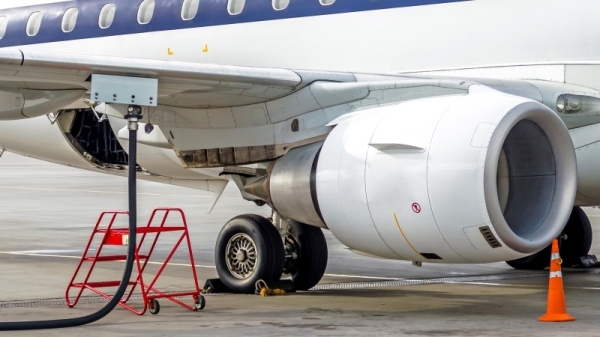Support grows among member states for waste biofuels aviation cap

At least five EU countries want to see the amount of green jet fuel from used cooking oil (UCO) legally capped, EURACTIV has learned, a requirement that would have significant ramifications for the production of sustainable aviation fuel (SAF) in Europe.
On Tuesday (25 April), member states and the European Parliament will meet to finalise ReFuelEU Aviation, the EU’s green aviation fuel law.
At an internal meeting of member states ahead of the negotiations, several country representatives raised concerns that unless a limit is created on the amount of waste feedstocks that can be used for SAF production, they could be monopolised by the aviation sector.
Advanced biofuels are used to replace fossil fuels in the road transport and maritime sectors, with fears arising that SAF production will reduce biodiesel availability for heavy-goods vehicles and ships.
The EU wants all aircraft refuelling in the bloc to use a gradually increasing percentage of green jet fuel, in a bid to cut aviation emissions.
Under ReFuelEU Aviation, airlines will be required to uplift a set percentage of SAF, which will gradually increase at roughly five year intervals, reducing the sector’s reliance on fossil fuels.
The mandate will be limited to start, with just 2% of overall fuel to be SAF by 2025, rising to the majority of aviation fuel in the bloc by 2050.
The European Parliament has proposed an 85% SAF blending target by 2050, while the Council has put forward a more conservative goal of 63% by the same date.
However, is speculated that the SAF mandate could slow progress towards overall transport sector climate targets.
At the meeting of EU country representatives, known as Coreper, five member states, ranging from larger to smaller countries, pushed for a cap on waste biofuels to be included in the Council’s negotiating position.
Other countries were reportedly supportive of the move, though have so far declined to officially back the position.
HEFA and e-fuels
Hydrogen-derived e-fuels, which are produced from green electricity, are expected to make up the bulk of SAFs in the coming decades, but supply is currently extremely limited.
As a result, biofuels refined from UCO and certain animal fats are considered the most affordable means to produce SAF.
It is predicted that without a cap, the majority of the EU SAF mandate will be met with waste biofuels for at least the next decade, as UCO is relatively cheap and the technology to refine it into jet fuel is mature.
Fuels derived from UCO and animal fats are commonly referred to as Hydroprocessed Esters and Fatty Acids, or HEFA.
A recent UK position paper setting out options for the UK’s own green jet fuel law proposed to cap HEFA on environmental grounds.
The imposition of a cap would “ensure that HEFA use in aviation does not lead to diversion of feedstocks that are still required for the decarbonisation of difficult-to-decarbonise road transport vehicles”, according to the consultation document.
The European Commission’s original proposal restricted SAF to e-fuels and second-generation biofuels from feedstocks set out in annex IX of the EU’s Renewable Energy Direction (RED).
No cap was placed on the amount of SAF that can be produced from these feedstocks.
But restricting HEFA will spur innovation into new forms of SAF production, helping the EU to meet its green jet fuel goals more sustainably, it is argued.
“Capping the contribution of HEFA fuel in ReFuelEU would send a policy signal to investors to support the SAF technologies needed for significant decarbonisation in the aviation sector in the long term,” Chelsea Baldino, a researcher with the International Council on Clean Transportation (ICCT), told EURACTIV.

UK suggests restricting green jet fuel from waste cooking oil
Green jet fuel made from used cooking oil and animal fats should be restricted on environmental grounds, a recent British government consultation document has suggested, raising questions over whether the EU will follow suit.
Final negotiations?
There is high-confidence among lawmakers, NGOs, and industry that a deal will be reached at Tuesday’s ReFuelEU Aviation negotiations.
However, a December meeting touted to be the last was derailed over the role of e-fuels produced by nuclear power, reflecting the uncertain nature of legislative negotiations.
The co-legislative branches are still to agree on the final targets for the SAF mandate, and the precise definition of what is eligible as a SAF.
Both the Parliament and Council have proposed to go beyond the European Commission’s SAF definition, a move that has been welcomed by the fuels industry though met with scepticism by the European airline industry.
While the fuel industry argues that a broader SAF definition will make it more likely that ambitious green fuel targets can be met, the airline industry is worried that should a feedstock prove to be unsustainable, the reputation of SAFs as a whole will be tarnished.
More on the same topic...




